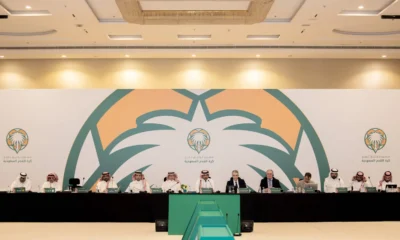Home » Interviews » Technical Expert Omar Ashraf to Arabisk London: I Hope to Establish a National Academy in Saudi Arabia to Educate Civil Aviation!
Interviews
Technical Expert Omar Ashraf to Arabisk London: I Hope to Establish a National Academy in Saudi Arabia to Educate Civil Aviation!
Published
5 months agoon
By
Huda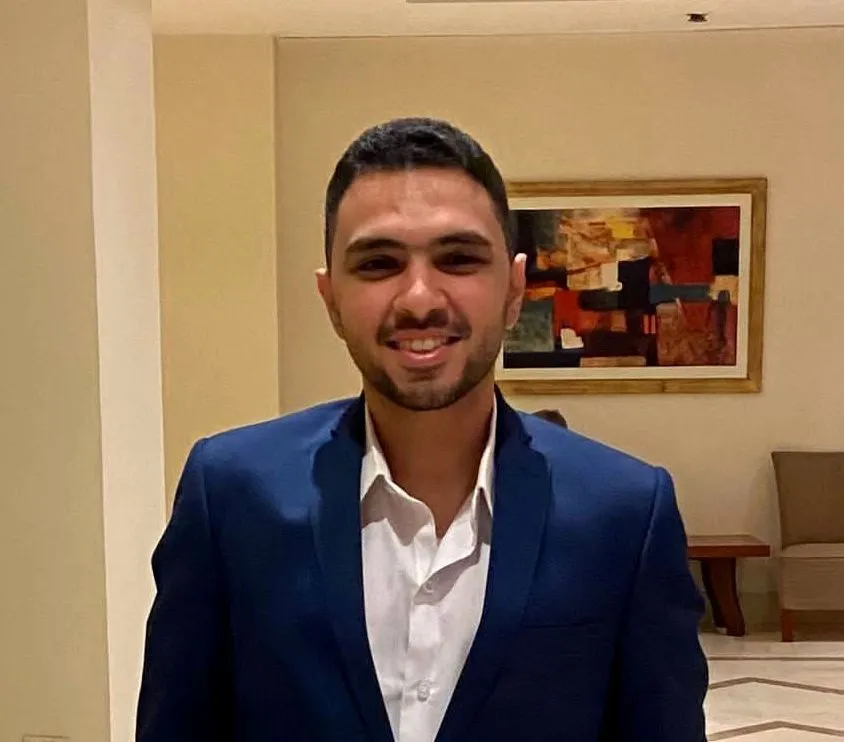
Omar Ashraf, is a youthful, imaginative person who is seeking a firm footing in the technology industry and believes in his capacity to contribute and succeed.
Interviewed by: Mohsen Hassan
His dreams and aspirations were entwined in Saudi Arabia and Egypt, between the recollections of childhood and adolescence and the realities of youth and its difficulties.
However, Omar Ashraf is a tenacious tech specialist, whose path of struggle led him from petroleum engineering to software testing engineering, becoming a technical evaluation expert capable of separating the valuable from the worthless from millions of harmful and beneficial applications. He is also aware of what the fundamentals of digital transformation should be in the realm of large logistics companies and sophisticated electronic strategies.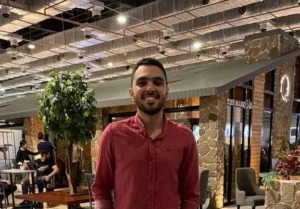
Despite all of this, he still longs to fly freely in Arab skies, away from the monopoly of Washington or Johannesburg. He is so certain of this that he hopes the Saudi leadership will embrace the idea of opening a local academy to teach civil aviation to ambitious young people.
In an interview with Arabisk London, Omar Ashraf, the young technician discussed the significance of his domain of expertise concerning Saudi-Egyptian collaboration in the areas of cybersecurity and network modernisation.
To begin with, what does the Kingdom of Saudi Arabia, the nation in which you were born and nurtured, mean to you?
For me, the Kingdom of Saudi Arabia is entirely different in terms of location and social standing. From my earliest childhood, until I was ten years old, I was engulfed by its surroundings and its high, healthy atmosphere, and I was nurtured in its grounds and played in its trails.
Even though this time frame, which spanned from 1996 to 2006, was brief, it had a significant impact on me and made me yearn for this area and the people I grew up with throughout those years.
I can still recall all of its little and large features, and it is a fresh cause for my unwavering devotion to this nation that serves as both my home and second home, and I frequently look forward to going back there to relive my early years.
The Kingdom is experiencing a promising civilisational shift in many disciplines, which I also watch with respect. One day, I hope to have the chance to help with this advancement.
What are the factors that led you to switch from petroleum engineering, your area of expertise, to software testing, a different field?
The Egyptian university program served as the foundation for my petroleum engineering specialism, and I was enthusiastic about working in this important field at the time. In its early years, it encouraged creativity and innovation and offered financial and other rewards.
But over time, its appeal diminished, its incentives dwindled, and it turned into a deterrent to skills and abilities. Several reasons contributed to this, such as the high number of graduates and the drop in their degree of education, as well as the low financial return concerning the magnitude of the risks and challenges associated with workplaces, which coincided with the advent of digital and software technologies.
Following a period of trying out support work, whether in telecommunications companies or the field of occupational safety engineering, I decided to do a career shift or change my career and professional path, and the emergence of new professional and electronic horizons that encourage discovery and proving merit, among other factors, really pushed me to pause, reflect, and correct the situation according to my personal and personal ambitions. I chose the field of software testing.
What stage does your job in software and application testing occur at, and when does it start?
After the software or application developer has inserted the programming code, whichever these apps are, my duty and stage in this sector begin. He must perform a test on his work after completing any portion of the software structure to move on to the next phase.
I do this either manually or through more sophisticated and challenging methods like automation testing, which calls for precise knowledge of programming languages to feed it sequential codes to finish the testing procedures associated with the part to be tested, in addition to further methods that are too many to discuss in detail here.
The significance of software testing comes from its association with assessing the programs that are the focus of testing, also known as quality control. Its objective is to create software products that have the best possible functions and performance.
From your perspective, Omar Ashraf, as a young, talented Egyptian-Saudi energy, how can scientific and technological skills be exchanged using the good connections between Cairo and Riyadh?
We are moving towards establishing high-level bilateral ties between the two nations in the technical and technological sphere. Over the last several years, Saudi software businesses have been quite open with Egypt, which is a good beginning for the development of mutual competence between young Saudi and Egyptian cadres.
Nonetheless, I think that these businesses in the Egyptian market need more financial incentives to draw in more young Egyptian talent. This would help to lessen the significant salary and wage disparity between Saudi businesses operating in Egypt and their Kingdom-based counterparts, obviously from the perspective of young Egyptian technical cadres.
It will undoubtedly result in the exchange of high-level expertise, talents, and competencies between the two parties if the Kingdom can lessen these disparities by approving a wage financial regulation that is comparable to the financial regulations used by local businesses in the Kingdom.
However, I think the Kingdom should take advantage of this constructively and innovatively because the Egyptian software markets can support more Saudi businesses.
As a technical specialist, what do software application firms require to accomplish their objectives of preparing and training young cadres to meet the difficulties of future development and advancement?
The implementation of the work system requires organisational strictness not only at the management and operation level but also at the technical and software styles used from applications and programs related to this management and operation. We are constantly in technical companies or companies that are working to increase technical efficiency, and when we talk about software testing, we are talking about a field that is extremely sensitive, precise, and dangerous all at once.
Given the growth and dispersion of programmers and the variety of their technical levels, competencies, and unique goals, this field is primarily concerned with assessing the effectiveness of programs and applications meant to be used in any of the businesses or critical sectors in the state and society. It also seeks to ascertain the degree of such programs’ performance, efficiency, and suitability or inappropriateness for the field for which they were brought.
Testing millions of programs and applications—particularly those proposed for use in sensitive and private activities and important fields—demonstrates the significance of this discipline.
Thus, businesses in the technology sector in general and software testing in particular need to give their workers a high level of financial generosity, mental focus, ease of use, and the technical motivation for success and innovation. They also need to be able to generate cadres that can support technological and digital transformation.
Which area does Omar Ashraf think Saudi, Egyptian, and Arab youth should concentrate on the most in the upcoming phase? And why?
As a societal philosophy, no field should be neglected. The criterion in this context is always the individual’s inclinations and the degree of his passion for what he loves to learn and master.
However, when discussing the priorities of the present and future phases, the technological field in all of its spectrums will continue to receive the most attention and interest from young people in Saudi Arabia, Egypt, and the Arab world.
Since technology has permeated every aspect of human and humanitarian endeavours, both public and private, and because we in developing nations urgently need to eradicate technical and technological illiteracy to avoid falling behind more developed nations, the fabric of modern and contemporary technology is still loose and broad, offering a wide range of options for aspirational young people who want to excel and specialise in certain technical fields; the fields we discussed include software development, data science, which focusses on studying data, DevOps, which combines the specialisations of development and operation, and a plethora of other technological fields that are gaining popularity and spreading and should also be given priority for research and specialisation.
Based on your personal views of your former field of specialisation in petroleum engineering, first, why has Egyptian youth’s interest in working in these firms declined? Second, do you believe the situation is different for Saudi youth?
In contrast to what I stated in my answer to the second question, there are a number of factors that contributed to this drop, one of which is the fact that young people are less interested in this profession now than they were two and a half decades ago.
Additionally, low production and fluctuating oil prices forced many oil companies to reduce their annual production profits as well as lay off specialists and employees in order to cut costs. This, in turn, led to the loss of the industry’s motivating factors, particularly due to the fact that employees must continually spend a lot of time away from their families and kids.
However, it is important to recognise that there are very few job openings in the oil industry and associated businesses. This has influenced the choices made by young Egyptians for this specialisation (petroleum engineering) when they applied to universities; working in this industry is no longer an option for students submitting their applications.
Regarding Saudi youth, the situation is undoubtedly different since, despite the ups and downs in oil prices, the Kingdom is one of the biggest oil-producing nations in the region and the world, which lends the profession a material and ethical significance that Saudi young find appealing.
Furthermore, under the authorised Saudization schemes since the Vision’s launch in 2016, Vision 2030 required foreign oil companies to hire a certain percentage of petroleum graduates there. This, of course, maintains the speciality’s appeal to Saudi youth graduates.
Digital transformation and dependence on technology are gaining popularity in the Arab world, particularly in Saudi Arabia and the Gulf area. What are your thoughts, Omar Ashraf, on this interest? What are your top suggestions for businesses attempting to make this change?
Indeed, the Gulf region, and Saudi Arabia in particular, excel in this regard, as the great majority of services offered by the public, government, and private sectors have become digital and automated without the need for numerous laborious field and geographical movements, which is undoubtedly a positive phenomenon. Official interest in digital transformation is what our region is currently experiencing.
Since it saves a great deal of time and effort for all parties involved, I would advise that in this case, it is essential to work towards improving the quality and quantity of this digital transformation while also making it easier for the user. This means that the applications used must be able to withstand the pressures of the services offered in their variety and breadth, as it is unacceptable to offer any customer a weak or challenging-to-use digital service.
You have some misgivings regarding the Arab world’s and Egypt’s workplace safety situation. What about these reservations? Have you, Omar Ashraf, ever had any direct involvement in this field?
Through my direct interaction and observation of the history of this subject’s work from a practical and field viewpoint, I came to understand its true significance; nevertheless, I also discovered a serious lack of funding, support, and evaluation for those who oversee or operate in it.
It is somewhat odd that a crucial topic like this one corresponds to the hazards of companies, occupations, and other industries while receiving little financing, interest, support, or development.
Nevertheless, we also urgently need to find creative ways to remove the occupational safety engineer’s role from its dull and traditional framework, which causes him to become estranged from his surroundings and professional environment. We also urgently need to raise awareness of the significance of the Safety Engineer among Arab professionals, workers, craftsmen, and employees.
As a young person’s spokesperson and via your professional and real-world experiences. In terms of career and qualifications, which is better for young people: switching between professions and jobs or being committed to a single career and employment field?
I think that sticking to one area of work is far better than hopping between several disciplines and professions, but this depends on the individual knowing his professional and job inclinations.
If these inclinations do not exist, there is nothing wrong with changing occupations until a choice becomes obvious. After that, following the choice and making an effort to develop the skills and abilities required to go to higher career and work levels in the same sector are vital.
Do you think Egyptian and Saudi youth need greater travel opportunities between the two countries? Do you intend to return, settle, and work in the Kingdom?
Yes, it is obvious that to finish these facilitations, we Saudis and Egyptian young need each other’s support. As a young Egyptian, I hope that travelling to Saudi Arabia will be as simple as moving to the Emirates, for instance.
Therefore, I think there should be greater flexibility in the Kingdom’s travel regulations, particularly concerning young individuals who have acquired new skills, abilities, and specialisations.
I believe that the more autonomy the Kingdom allows visitors to its land, the more successful it will be in identifying skills and abilities and expanding on exciting experiences and experimentation. Though it has to do with unique, individual, and functional circumstances not yet disclosed to the public, the desire to return to the Kingdom and dwell there does exist.
Are you still interested in pursuing a career in civil aviation? What first drew Omar Ashraf to pursue a career as a pilot?
Indeed, the dream still haunts me because it has existed since my early childhood, but I’ve grown increasingly certain that it is nearly impossible to fulfil, particularly since I became an expert in software testing and because learning to fly and gaining experience is becoming more and more expensive.
I would concede, though, that if there is a good chance to realise the dream, why not? Because I adore the atmosphere of flight and its thrilling, adventurous universe, I decided to become a pilot.
Speaking of aviation, the Kingdom has made significant strides in this area lately. Do you think Saudi Arabia should build an Arab academy to educate civil aviation to its youth?
If you want the truth, this is a great concept and a suggestion that deserves consideration since Saudi Arabia is an Arab nation, and aviation aficionados in the Arab world will discover that learning to fly there is a really advantageous chance.
The idea of opening an academy to teach civil aviation in the Kingdom or opening branches in the Arab world, for instance, is one that I think is excellent because it aligns with the investment and tourism development plans outlined in the ambitious Vision 2030. In Egypt, for instance, the majority of these enthusiasts face the choice to travel to either South Africa or the United States of America.
Since this idea is lucrative, fruitful, and civilised, I hope that the Saudi government will embrace it and realise it as soon as feasible.
Lastly, what guidance would you provide to young people in your generation generally and to those employed in your technical sector specifically?
In a nutshell, my suggestion is to concentrate on professional sectors that are in great demand due to their high return on investment, financial recompense, and plenty of accessible chances. I advise those who work in my technical profession to exercise caution since there is now intense competition and it takes more work and firsthand knowledge of the most recent technical specifics to take advantage of chances.

Rawan Al-Hamidi: Balanced Opinion Pieces Demonstrate the Journalist’s Objectivity

Diriyah’s Popular Cafés: Art & Creativity Collide with Genuine Heritage
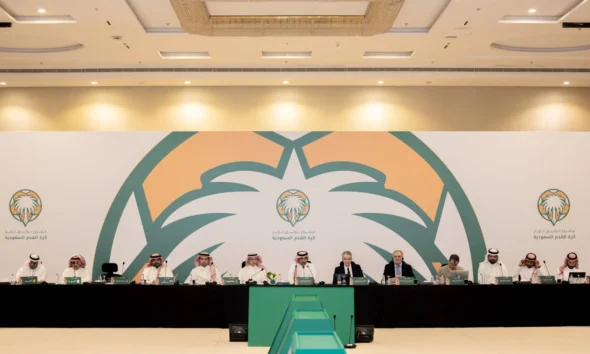
Saudi Football Documentation Project: Extensive Disputation

Nammos Resort AMAALA: KSA’s New Address for International Luxury Hospitality
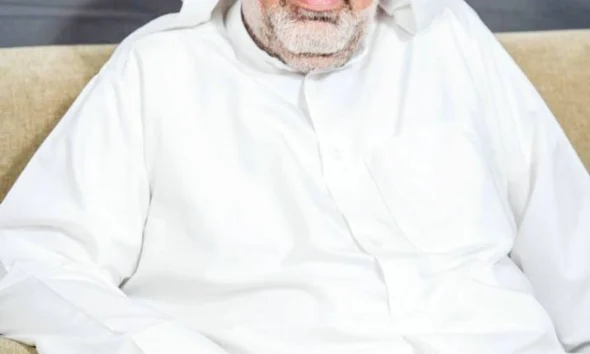
Muhammad Mahfouz: Trump will Respond to Riyadh’s Ambitions, and We Must Develop a Gulf-Arab Project with Iran






